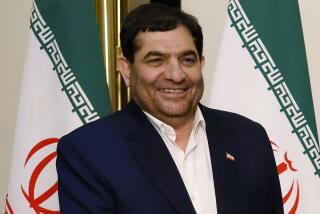Governor of Egypt’s Central Bank resigns
CAIRO -- Egypt’s Central Bank Gov. Farouk el-Okdah resigned Thursday amid tumultuous economic conditions marked by shrinking foreign reserves and the continuing decline of the Egyptian pound against the U.S. dollar.
President Mohamed Morsi accepted El-Okdah’s resignation and appointed Hisham Ramez, executive director of Commercial International Bank and a Central Bank board member, as governor. Ramez will take up his post Feb. 3.
“I offer all of my congratulations to my colleague and friend,” El-Okdah said during a news conference at the presidential palace. “I am happy that the president put his trust in my colleague Hisham. He is up to this duty.”
El-Okdah’s resignation comes at a time when a much-needed $4.8-billion loan from the International Monetary Fund continues to be postponed as Egypt struggles to stem its budget deficit and cut government spending, including proposed unpopular reductions to food and energy subsidies.
State-run television reported last month that El-Okdah, who has been the bank’s governor for nine years, had resigned for health reasons, but the presidential office denied the reports the next day. News reports had intimated that since summer that he was preparing to leave the post.
Egyptian economic experts suggested that in recent weeks he may have been dissatisfied with the Morsi administration’s economic outlook and its plans to devalue the pound. The Egyptian pound traded at 6.5 to the U.S. dollar on Thursday.
“It is known that the International Monetary Fund usually asks countries who will borrow to devalue their currency, but I believe El-Okdah didn’t want the fall of the pound to happen under his watch,” said Magdy Sobhi, an economic expert at Ahram Center for Political and Strategic Studies.
Sobhi said the governor’s resignation was widely expected, but it is unclear why it took him this long.
“A few weeks ago, it seems that El-Okdah tried to resign, but was kept from doing so by the presidency,” he said. “With the way the economy was faltering, El-Okdah’s resignation would have looked bad for the president.”
Morsi in a public speech last month assured Egyptians that the country was “far from bankruptcy” as foreign reserves continued to fall.
Simultaneously, the Central Bank announced emergency measures to auction off foreign currency in an attempt to stave off a run on reserves. In December, the bank reported that foreign reserves had dropped by more than 50% over the last two years to $15 billion. The bank called that figure a “critical minimum level.”
ALSO:
Three female Kurdish activists slain in Paris
Freed Iranian hostages rejoin families after months in Syria
Senior Scotland Yard detective found guilty of misconduct
More to Read
Sign up for Essential California
The most important California stories and recommendations in your inbox every morning.
You may occasionally receive promotional content from the Los Angeles Times.










